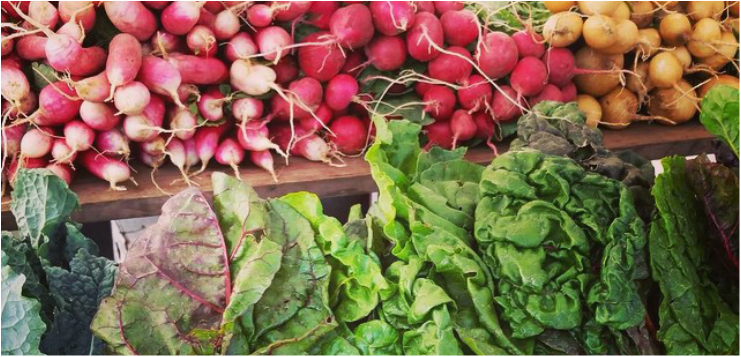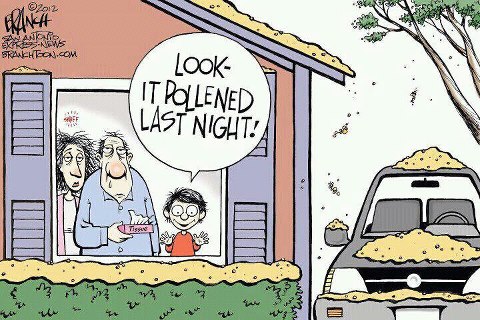| I am super excited to announce that we are now proud sponsors of the River Arts District Farmers Market. The RAD Farmers market will be every Wednesday from 2:00-6:00pm at 175 Clingman Ave (next to All Souls Pizza). The market season begins on Wednesday, May 4th and runs until November 30th. They have a wonderful and unique group of local farmers, producers, artisans, artists and musicians that participate. We will participating in the market on the first Wednesday of June, July, August and September. (Thats June 1st, July 6th, August 3rd, September 7th). We will be offering complimentary "mini" acupuncture treatments and we will also have our herbal infused goodies for sale. So be sure to come and stock up on great quality produce & products, support local farmers and help our community flourish! |
|
4 Comments
1: Get a Neti Pot
Using a neti pot is a great way to flush dust & pollen from the sinuses. The salt and water solution used in the neti pot will also help to thin mucus from the sinuses and make it easier to expel. When your sinus symptoms flare up, you can use your neti pot daily to alleviate symptoms. But remember, you can have too much of a good thing. As symptoms resolve, decrease use and turn to your neti pot as needed; overuse can dry out the protective mucus membranes that prevent you from getting sick. You can typically find a neti pot at your local drug store or health food store. Here is an example of one on amazon. 2: Avoid Mucus Forming Foods While mucus plays an important role in moistening the organs and trapping toxins that need to be excreted, over production of mucus can make us miserable. This time of year when pollen is in excess, our mucus membranes often go into overdrive. The once beneficial mucus can thicken, turn to phlegm and lodge in the sinus and nasal cavities, lungs and gut. Our diet can increase the production of mucus & phlegm and exacerbate seasonal allergies. Foods that generate more mucus include dairy products (milk, cheese & yogurt), foods high in sugar (soda, fruit juices, candy, ice cream, breakfast cereals), greasy or fried foods, and alcohol. Eating these foods in moderation is best for our overall health, but especially if you suffer from seasonal allergies this time of year. Some foods that you can incorporate into your diet to help break up phlegm & mucus include grapefruit, lemon, lime, cranberry, garlic, onion, ginger and dark leafy greens. 3: Start getting Acupuncture The Western treatment for seasonal allergies typically involves the use of antihistamines & decongestants. While this route can be effective, it often comes with side effects and it only focuses on treating the manifestation of the condition, it does not address the root cause. Acupuncture is a great treatment option for those who suffer from allergies because it addresses the underlying cause and those aggravating symptoms including runny nose, itchy eyes, headache, coughing and sneezing. My best piece of advice is to start getting acupuncture treatments before your seasonal allergies kick in. It is best to start treatments now, while our surroundings are still not yet in full bloom. This will help to boost the immune system and allow the body to be strong enough to prevent seasonal allergies from getting out of hand. However, if you miss that preventative window, acupuncture can still help shorten the duration and severity of your existing symptoms. 4: Keep Chinese Herbs on Hand Similar to acupuncture, Chinese herbs are great for seasonal allergies because it addresses the root cause as well as the symptoms. Also, herbal treatments typically have fewer unpleasant side effects compared to over-the-counter drugs. During your acupuncture visit, we can come up with a custom herbal formula that meets your specific needs. Many of the herbs that we use this time of year help to boost the immune system, support the lungs, open the sinuses, loosen mucus and resolve phlegm. There are also some great herbs that are easy to find and good have on hand for symptomatic relief. My favorite is mint tea. Mint is a cooling herb that helps resolve cough, headache, red eyes and sore throat. I like to add a little local raw honey to my mint tea, as it helps soothe the throat, alleviate cough, and strengthen the body's qi. Chrysanthemum tea is another herb that is great for red, painful, itchy dry eyes, headache and irritability. So, get ahead of your allergies and help knock them out before they start. As the days are getting longer and the weather gets warmer, you deserve to spend your time enjoying the outdoors rather than turning into a big phlegm ball that is dependent on Kleenex & Claritin. You do not have to spend another season suffering from allergies. For questions, contact us or go ahead and schedule an appointment today! |
Photo taken in Beijing, China
Sara MillsAcupuncturist & Herbalist Archives
January 2017
Categories
All
|



 RSS Feed
RSS Feed
